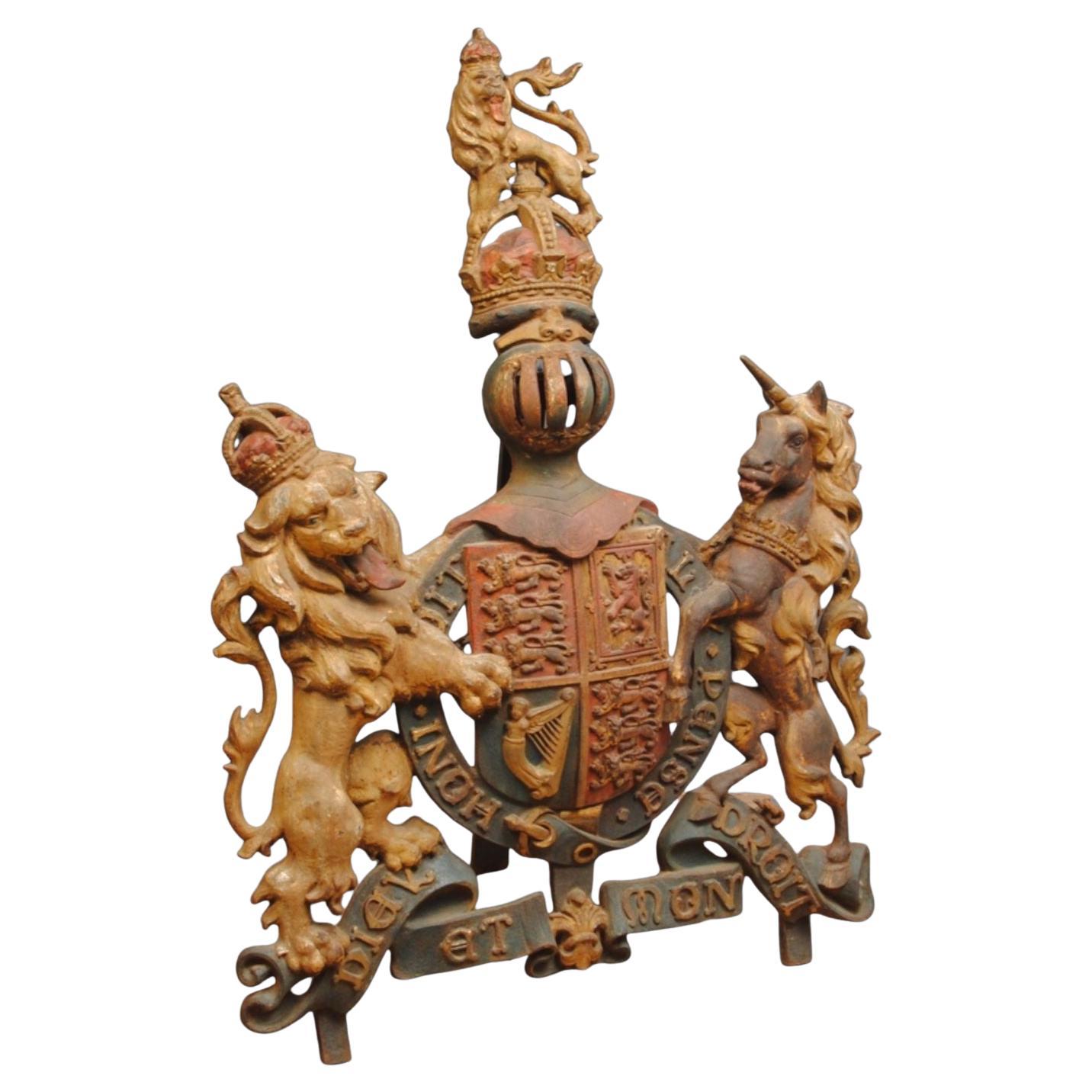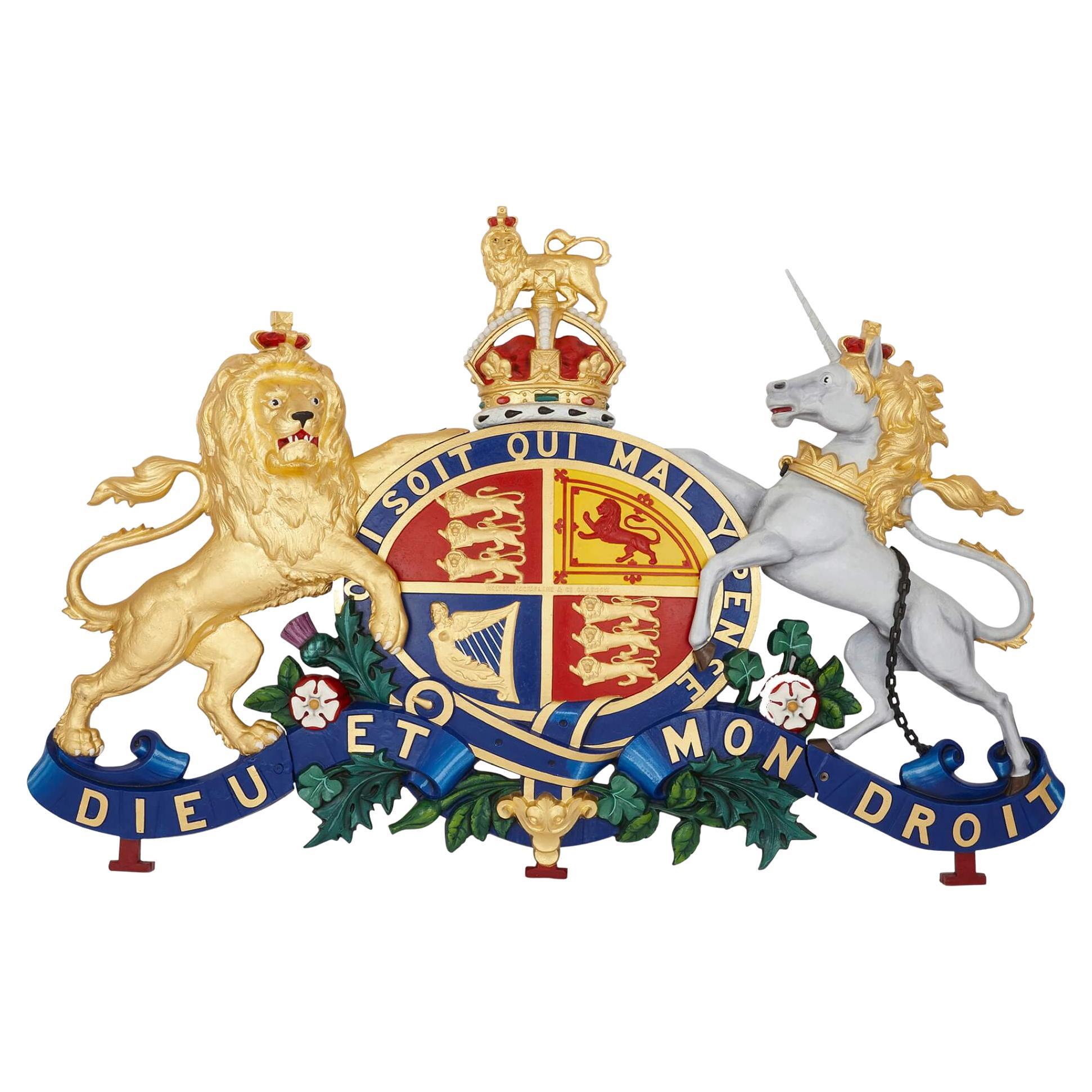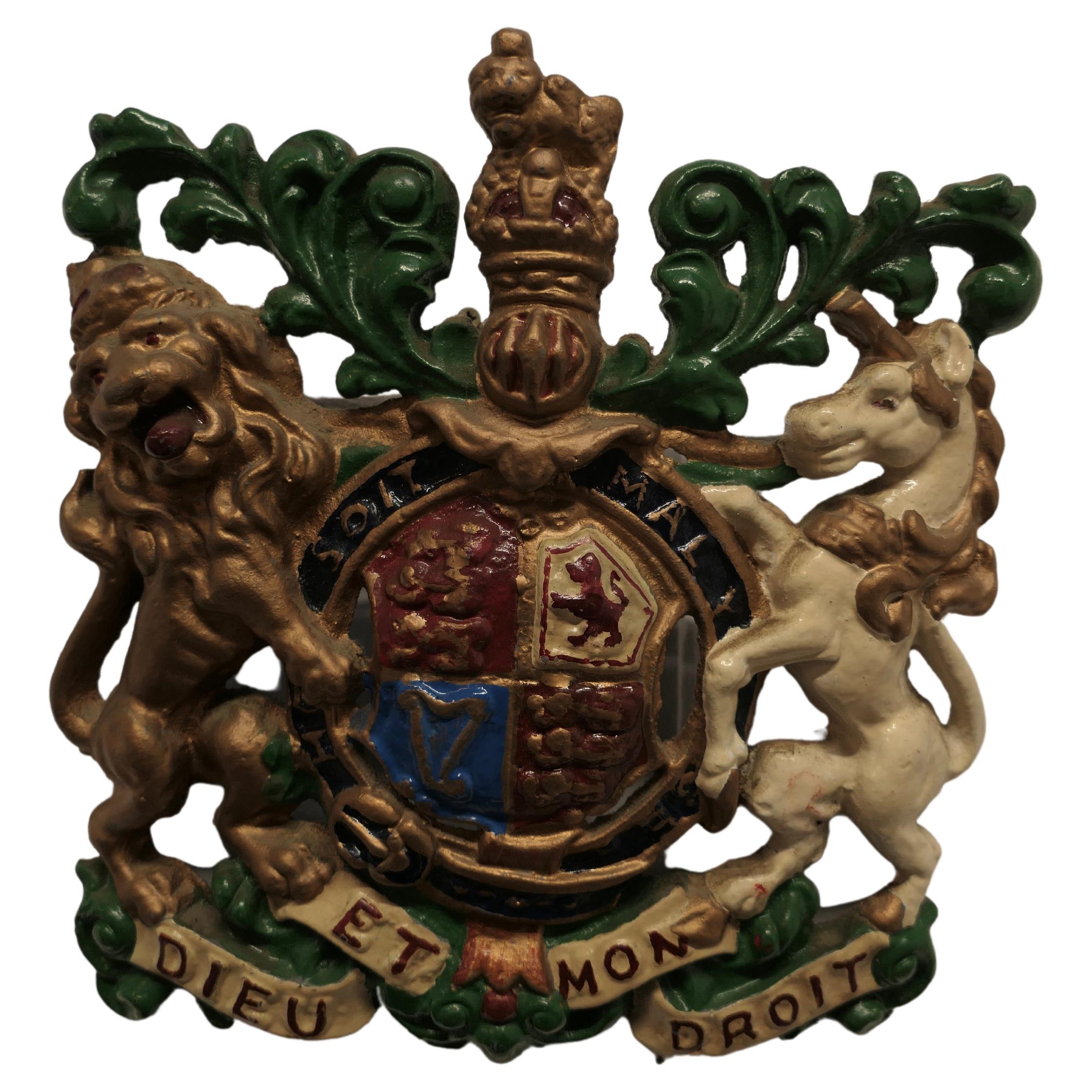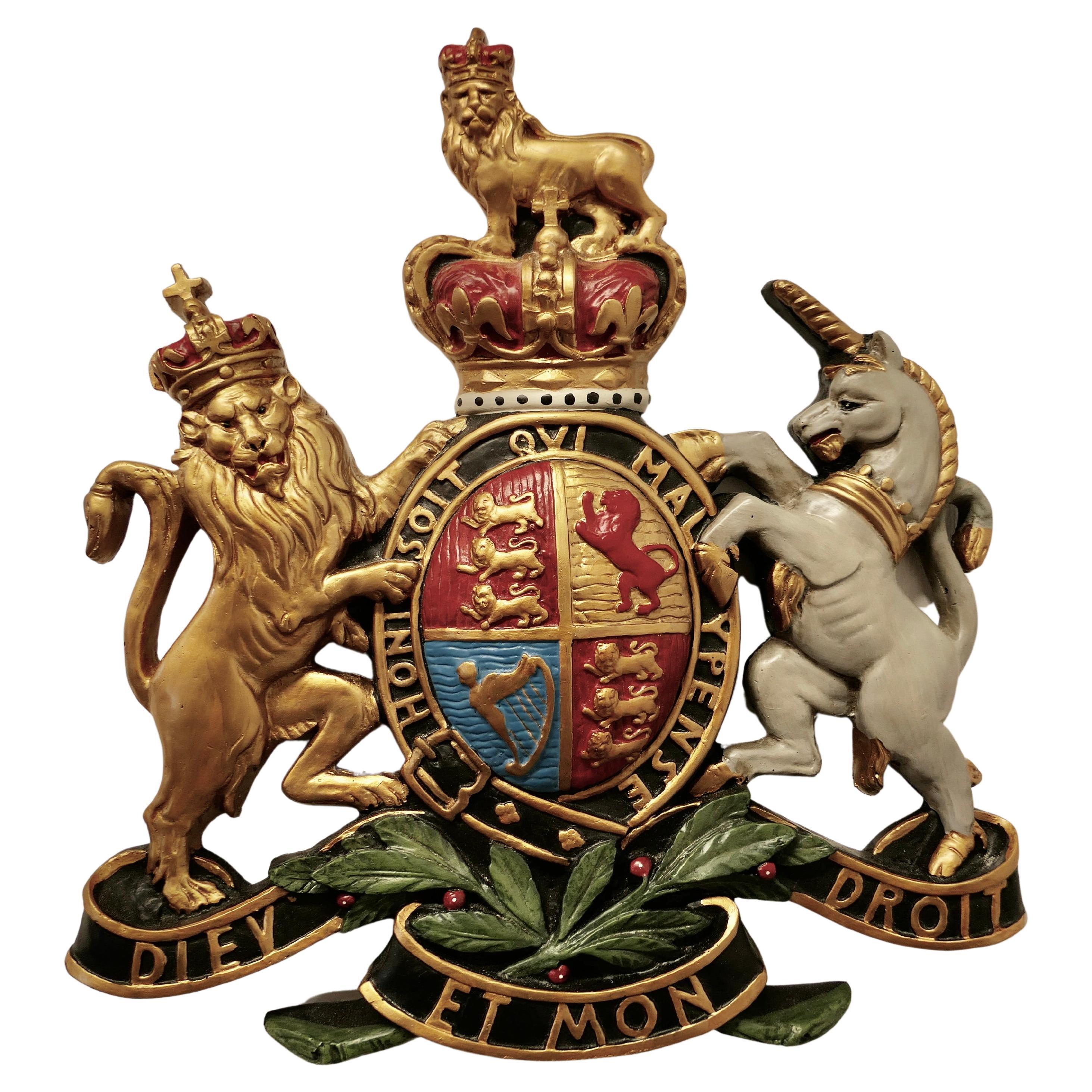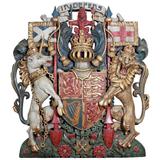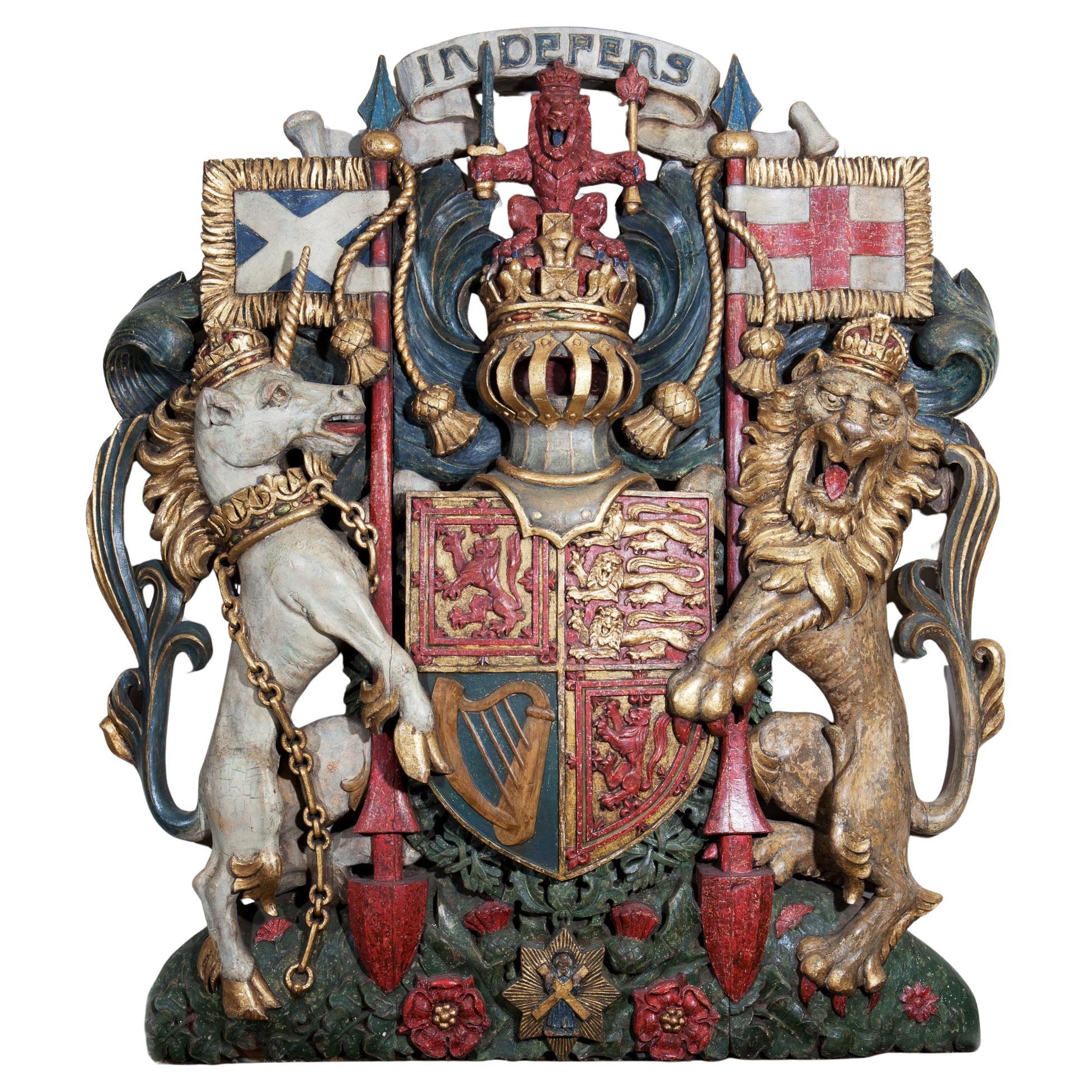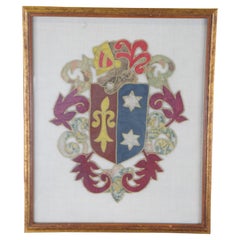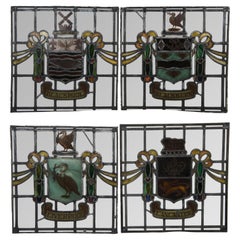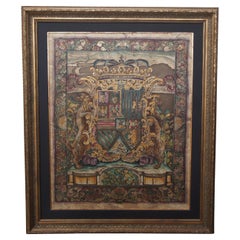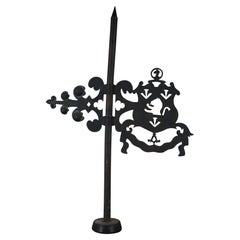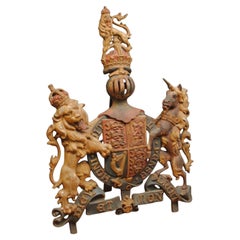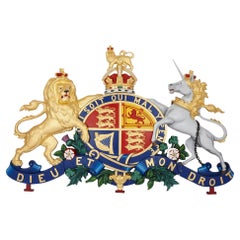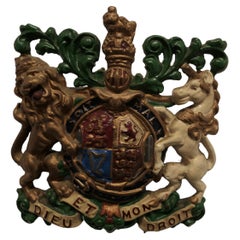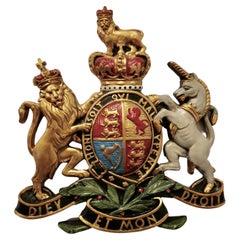Items Similar to Antique Walter MacFarlane & Co English Cast Iron Royal Coat Of Arms Shield 61"
Want more images or videos?
Request additional images or videos from the seller
1 of 13
Antique Walter MacFarlane & Co English Cast Iron Royal Coat Of Arms Shield 61"
$21,750
$29,00025% Off
£16,614.86
£22,153.1425% Off
€19,090.44
€25,453.9225% Off
CA$31,097.82
CA$41,463.7725% Off
A$34,262.56
A$45,683.4125% Off
CHF 17,736.38
CHF 23,648.5025% Off
MX$412,530.08
MX$550,040.1025% Off
NOK 224,585.41
NOK 299,447.2125% Off
SEK 210,983.79
SEK 281,311.7225% Off
DKK 142,534.19
DKK 190,045.5825% Off
About the Item
Very heavy and large Mid 19th Century English Cast Iron Royal Coat of Arms Shield or Crest. Made from solid Cast Iron from the Walter MacFarlane & Co, Saracen Foundry Possil Park Glasgow. This coat of arms was reclaimed from an English Great House in the 1980s.
The English Royal Coat of Arms has many elements to interpret:
The shield is divided into four quarters. The quarters represent the symbols of Ireland, England, and Scotland. Wales does not play a role in the Royal Coat of Arms as when the Act of Union came about the Kingdom of Wales was already integral to England.
The upper left and lower right quarters of the shield feature the three guardian lions of England. In the top right is the lion rampant, Scotland’s royal symbol. In the lower left is a harp which represents Ireland.
Surrounding the shield is the Garter circlet. The Order of the Garter is a chivalric order first started by Edward III, an English monarch. The circlet is inscribed with the order of the motto: “Honi soit qui mal y pense” (shame on he who thinks evil).
Above the shield is the royal crown which is topped with a golden crowned lion.
A lion, representing England, stands on the “Dexter” (right-hand) side. A unicorn, representing Scotland, stands on the “Sinister” (left-hand) side. According to ancient legends, a free unicorn was a dangerous beast. This is why the heraldic unicorn is chained.
The lion and unicorn stand upon a small frame, commonly referred to as a compartment. Along the compartment is the motto of English monarchs: “Die et mon Droit” (God and my Right). This motto has been carried to the present royal family.
Dimensions:
38" x 51"h x 6.5"
- Creator:Walter MacFarlane & Co (Manufacturer)
- Dimensions:Height: 51 in (129.54 cm)Width: 38 in (96.52 cm)Depth: 6.5 in (16.51 cm)
- Materials and Techniques:
- Period:
- Date of Manufacture:Mid 19th Century
- Condition:Wear consistent with age and use. slight wear to the paint from use and age.
- Seller Location:Dayton, OH
- Reference Number:Seller: 405801stDibs: LU5343238522872
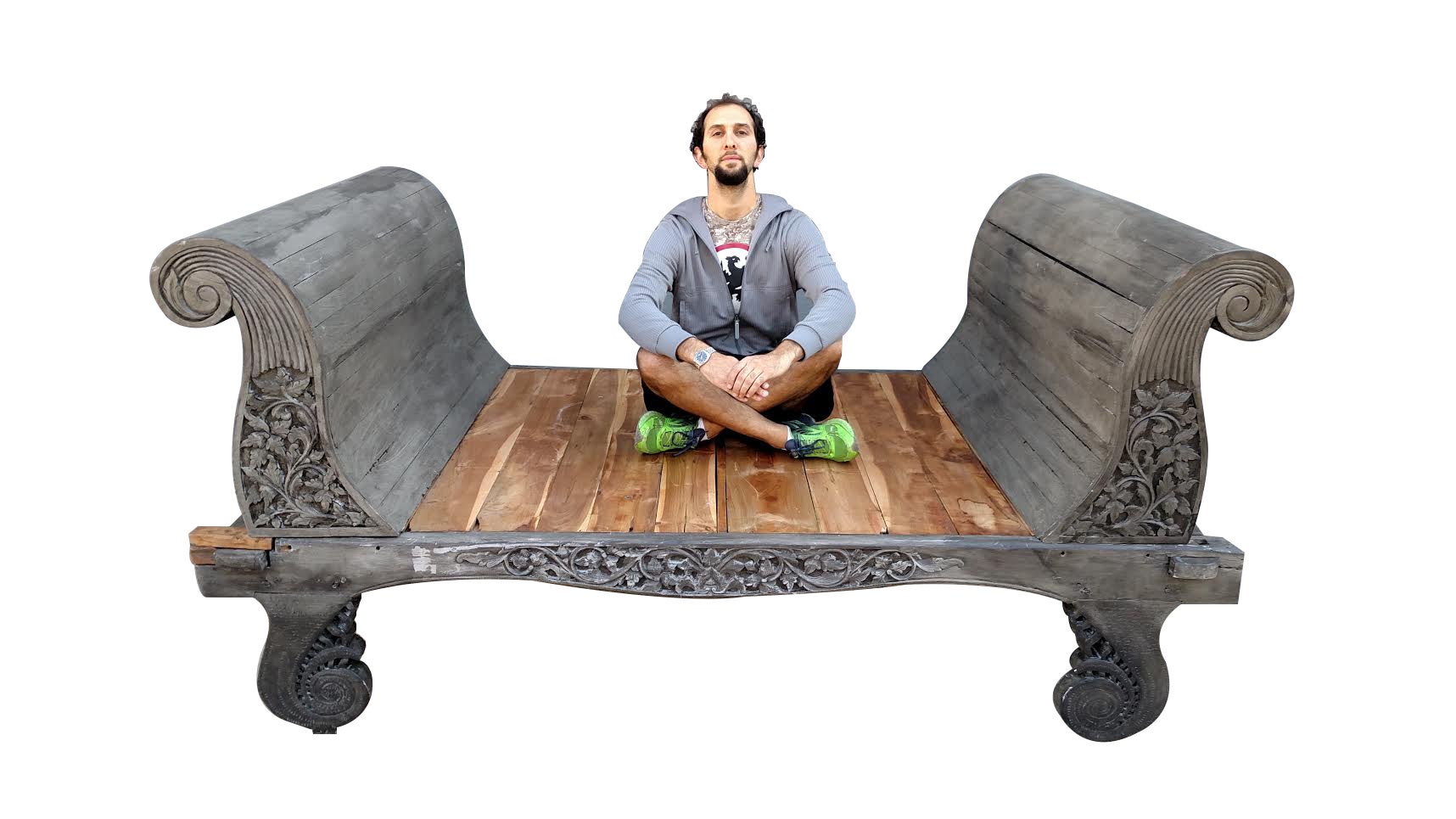
About the Seller
5.0
Platinum Seller
Premium sellers with a 4.7+ rating and 24-hour response times
Established in 2010
1stDibs seller since 2020
1,669 sales on 1stDibs
Typical response time: <1 hour
- ShippingRetrieving quote...Shipping from: Dayton, OH
- Return Policy
Authenticity Guarantee
In the unlikely event there’s an issue with an item’s authenticity, contact us within 1 year for a full refund. DetailsMoney-Back Guarantee
If your item is not as described, is damaged in transit, or does not arrive, contact us within 7 days for a full refund. Details24-Hour Cancellation
You have a 24-hour grace period in which to reconsider your purchase, with no questions asked.Vetted Professional Sellers
Our world-class sellers must adhere to strict standards for service and quality, maintaining the integrity of our listings.Price-Match Guarantee
If you find that a seller listed the same item for a lower price elsewhere, we’ll match it.Trusted Global Delivery
Our best-in-class carrier network provides specialized shipping options worldwide, including custom delivery.More From This Seller
View AllAntique 18th C. Embroidered Italian Heraldic Armorial Coat of Arms Tapestry 20"
Located in Dayton, OH
An antique hand stiched 18th Century Italian armorial heraldic embroidered coat of arms. Features a knights helmet over a shield with star of...
Category
Antique 18th Century Tapestries
Materials
Fabric, Glass, Wood
$468 Sale Price
25% Off
4 Antique English Armorial Heraldic Coat of Arms Leaded Stained Glass Windows
Located in Dayton, OH
A fascinating set of 4 Victorian late 19th century English leaded stained glass windows. These beautiful specimens showcase the wonderful Heraldy of the United Kingdom with the shiel...
Category
Antique Late 19th Century British Victorian Windows
Materials
Metal
$9,375 Sale Price / set
25% Off
Buckingham Crest Etching on Canvas by Liz Jardine Heraldic Shield Framed
Located in Dayton, OH
Buckingham Crest Etching on canvas by Liz Jardine, circa 1992. A large format art with an amazing frame. Features a heraldic crest or shield at the center ...
Category
1990s British Colonial Decorative Art
Materials
Canvas
$2,437 Sale Price
25% Off
Antique 15th Century English Wrought Iron Lion Coat of Arm Banneret Weathervane
Located in Dayton, OH
An exceptional and rare 15th Century English wrought iron banneret weathervane with lightning rod. Features an ornate arrow and pierced coat of arms or crest with lion. Marked “4 lb” on base.
The Rampant Lion with the crown above its head stood for royalty.
The Trefoils (2 on there sides and one at the point of the “spear”) stood for longevity and can also represent the Holy Trinity. The 3 Lilies are the precursors to the Fleur-de-lis, and were commonly used to signify purity, loyalty, piety, faith, and can also stand for the Virgin Mary.
Purchased from one of the Great Houses of England, where it was on display in their collection. Surely belonging to a royal families home or castle. The “4 lb. base” is something that was added much later, when it was taken off the building it had been on. The base allows it to display nicely.
Weathervanes have been around for over 2,000 years, invented by the Greek astronomer Andronicus in 48 B.C. to determine the direction of the wind. The first weathervane – also called a “wind vane...
Category
Antique 15th Century and Earlier English Architectural Elements
Materials
Iron
$2,250 Sale Price
52% Off
2 Rare Antique Manchester English Stained Glass Palladian Windows Coat of Arms
Located in Dayton, OH
A fantastic very large pair of exceedingly rare leaded stained glass Palladian window panels, circa late 19th century. Features the Manchester England Coat of Arms, aptly titled 'Co...
Category
Antique 19th Century High Victorian Windows
Materials
Lead
$37,500 Sale Price
65% Off
Antique Copper Embossed Tavern Scene Repousse Wall Plaque Charger Platter 24"
Located in Dayton, OH
Antique embossed copper repousse wall hanging charger / platter featuring a tavern scene at the center and Neoclassical motif of cherubs / putties, baskets of fruit and Green Man fac...
Category
Early 20th Century Dutch Colonial Decorative Art
Materials
Copper
$525 Sale Price
25% Off
You May Also Like
A SUPERB 19th CENTURY CAST IRON ROYAL COAT OF ARMS
Located in Lincolnshire, GB
A mid 19th century cast iron coat of arms with the most fabulous original polychrome and gilded decoration.
Now with an easel attached for easy display, but it still has the original...
Category
Antique Mid-19th Century English Decorative Art
Materials
Iron
Large Cast Iron Royal Coat of Arms of the United Kingdom
By Walter MacFarlane & Co
Located in London, GB
Large cast iron Royal coat of arms of the United Kingdom
British, Late 19th Century
Height 121cm, width 184cm, depth 22cm
This exceptionally well-crafted cast-iron sign is shaped in the form of the Royal coat of arms of the United Kingdom. It was manufactured in the late nineteenth century by Walter MacFarlane & Co, Scotland’s prime producer of ornamental ironwork.
The central shield of the coat of arms is occupied by designs symbolic of the four nations forming the United Kingdom. Three lions represent England and Wales, a rampant lion is symbolic of Scotland and a golden harp...
Category
Antique Late 19th Century Scottish Late Victorian Architectural Elements
Materials
Iron
Wall Hanging Victorian Cast Iron Royal Coat of Arms Shield Plaque
Located in Godshill, Isle of Wight
Wall hanging Victorian cast iron royal coat of arms shield plaque
This is a charming wall plaque is a heavy piece, it was originally wall hung probab...
Category
Antique 19th Century Georgian Architectural Elements
Materials
Iron
British Royal Coat of Arms Wall Plaque This Is a Large Scale Piece
Located in Godshill, Isle of Wight
British royal coat of arms wall plaque
This is a large scale piece, it dates from the 1950s and is made in plaster and it is painted in very brig...
Category
Mid-20th Century British Colonial Architectural Elements
Materials
Plaster
19th Century Royal Coat of Arms of the United Kingdom
Located in London, by appointment only
Scottish, after 1837.
This particular carving of the Coat of Arms of the United Kingdom as used in Scotland is marvellous for the tremendous vitality of the Unicorn and Lions. It ...
Category
Antique Late 19th Century British Early Victorian Wall-mounted Sculptures
Materials
Wood, Paint
The Royal Coat of Arms of the United Kingdom, c. 1910
Located in Reepham, GB
The Royal Coat of Arms of the United Kingdom as used in Scotland after Queen Victoria’s accession in 1837. And a very fine example of high quality and spirited carving, with both the...
Category
Early 20th Century Wall-mounted Sculptures
Materials
Oak
